Photographs: Reuters Amod Kumar and Sandeep Pandey
India's tax revenues have steadily risen in the last few years.
This has been primarily due to three reasons, high growth rate of economy, widening of the tax base and use of information technology for better tax collection with transparency, accountability and efficiency.
But the government is still looking for ways to generate more revenues.
There is one big opportunity which we are still missing. That is of scrapping the higher denomination (Rs 500 and Rs 1,000) bills (currency notes).
This is not a new proposal but we need to rethink about it under changed circumstances with the presence of credit card, net banking, mobile and other IT applications.
. . .
How to curb corruption? Scrap Rs 500/1,000 notes!
Photographs: Reuters
The government needs to announce a cut-off date (say March 31, 2011) about 2-3 months in advance for scrapping the big bills. In this 2- to 3-month period, people can go to banks (authorised for this purpose) with their existing bills of Rs 1,000 and Rs 500, and exchange them for the bills of Rs 100 denomination. All they need to produce there is a valid ID proof.
They will be . . .
How to curb corruption? Scrap Rs 500/1,000 notes!
To avoid that, people would resort more to electronic transactions like credit cards, debit cards, direct debit, cheque payment, etc. This will bring more money in tax net thereby increasing revenues.
This only creates inconvenience for the people with unaccounted or black money. For a person with hard earned white income, there are plenty of electronic means available to make payments.
Political parties and candidates would find it highly difficult to store huge amounts of cash for election expenses and to spend it during elections.
This would, to a limited extent, also help in cleansing electoral politics. Electoral politics is one of the main reasons for existence of corruption.
. . .
How to curb corruption? Scrap Rs 500/1,000 notes!
Photographs: Reuters
Even during initial exchange period of 2-3 months, it will be very tough for the people with black money. Once the scheme is announced, generally people would hesitate in accepting these bills.
People with lots of black money would not be able to convert it. If the government wants, it can announce a voluntary disclosure scheme (with a taxation of 50-60 per cent) along with this to unearth black money.
It doesn't affect more than 90 per cent of the people of the country who rarely use bigger bills. It will only affect the corrupt ultra-rich 2-3 percent people.
It also doesn't affect the people with white money no matter how rich they are. They can easily exchange it initially and also use electronic transaction to do business later on.
. . .
How to curb corruption? Scrap Rs 500/1,000 notes!
Photographs: Reuters
Thus, this scheme has the multiple benefits of increasing tax revenues, size of white economy and reducing black money and corruption.
The size of black money economy is estimated to be three times that of white money economy.
No scheme is 100 per cent fool-proof. This scheme also has its pitfalls. People would start using gold coins or other hawala kind of tokens to make large payments.
This may give rise to a parallel illegal currency. But chances of this are rare, as the acceptance of an illegal currency would always be very limited.
. . .
How to curb corruption? Scrap Rs 500/1,000 notes!
Photographs: Reuters
Even if this happens, still it would not be worse than the present situation, where black money is as freely and legally used in market as white money.
This would definitely cause a lot of inconvenience to people with black money. Many fence-sitters may decide not to indulge in corrupt activities because of this inconvenience in handling black money.
People can use dummies like servants, relatives during the initial exchange period of 2-3 months to convert large amounts of black money.
If the duplication check software is not strong or is not properly implemented, then a dummy person with a fake ID can exchange huge sums of money. Proper checks and balances would need to be designed in the scheme to control this.
. . .
How to curb corruption? Scrap Rs 500/1,000 notes!
Photographs: Reuters
For example, we can put a limit on the maximum amount of exchange allowed per person. Above that amount, he would need to produce his tax returns of last three years, etc.
If one objectively examines this scheme, this is definitely in national interest, even if it may not be in the interest of highly placed corrupt politicians and bureaucrats.
For whatever reason, even if the government can't implement it straight away, there is surely a case for further study or research or a committee's appointment to examine this from all angles.
Amod Kumar is a Uttar Pradesh cadre IAS officer on leave and works with a NGO IntraHealth. Sandeep Pandey is a social activist.

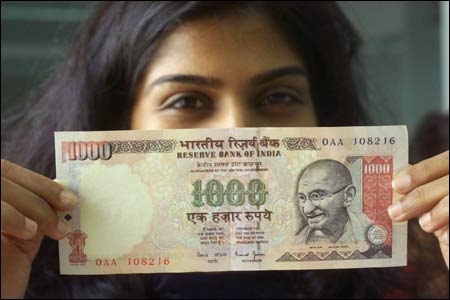
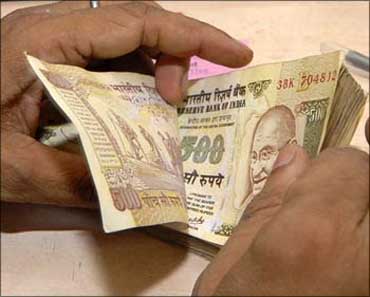
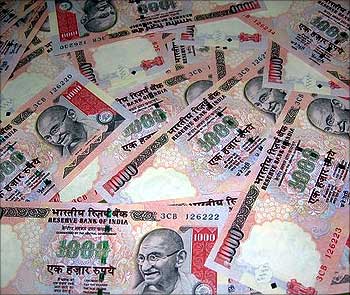

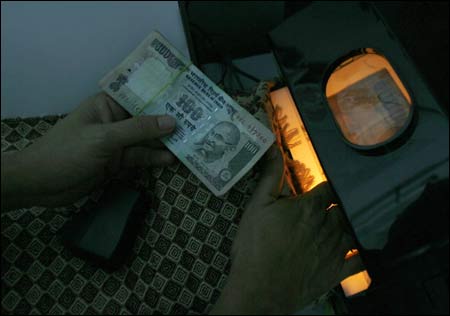
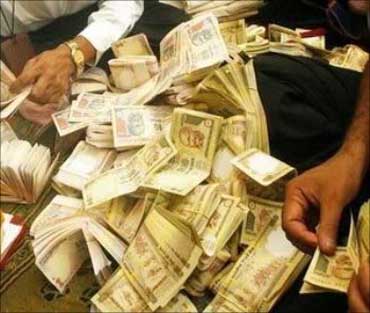
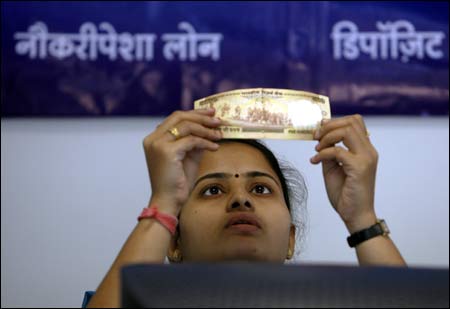
article